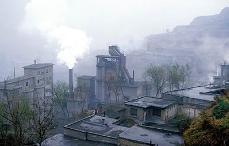In China, 320 people drink polluted water everyday. This polluted water is killing off crops and turning flora-rich river towns into “cancer villages.” The increased rates of cancer come from sources unseen in these little towns, which are home to rice patty fields and agriculture. The source is located upstream in areas where heavy mining and industry have allowed heavy metals to run into the rivers.
The water, carried downstream, is used by the village locals for irrigating their crops and drinking.
Associate Professor of Political Science George Guo said cancer is the result of lax policy and economic drive.
“Power was given to the local government, giving them flexibility (and) resulting in these provinces trying to attract investors,” Guo said. “The local governments lowered rent, lowered taxes and lowered standards to attract investment.”
Sophomore Mike Sexton thinks there is a catch-22 to the issue.
“These villages exist due in part to the government stripping the land of trees and mining,” Sexton said. “The government is doing this to support their people, and if they don’t people may die.”
These cancer villages are not something new. BBC News reported 250 people from Shangba’s population of 3,000 have died of cancer since 1987. However, BBC noted the factoid was found in a Chinese newspaper and that statistics in China are often unreliable.
Guo, who visited the Chinese countryside in 2005 said, “The place I visited is still remote, still poor, and there were chemical factories there.”
A chemical factory owner even told Guo that these chemicals were cancer-causing agents.
Sophomore Maria Kupper feels the government should be held responsible.
“The government should pay the medical bills of the people who feel sick and should better regulate the water and clean it,” Kupper said.
Many of the victim’s families, like Shangba native Wang Yan, who lost both her husband and mother to cancer last year, cannot pay for the medical bills.
“The disease destroyed them,” Yan told BBC. “They just got weaker and weaker until they couldn’t go on any longer. Now I am left here trying to get by as best I can and look after the children.”
He Shouming, an official from Shangba’s local Communist Party, said to BBC, “I have one family of three young children who have lost their mother and father. Our rice crops have failed because of the polluted water. What am I supposed to do? We can’t afford to move, so we are stuck here.”
Sophomore Kenza Hadj-Moussa feels the government should have regulated the mines better.
“It’s every government’s role to regulate what they put into the environment, especially when the repercussions are so evident,” Hadj-Moussa said.
According to BBC, the government has pledged to bring clean water to 160 million farmers by 2010, leaving many more with polluted water.
The pollution is still ongoing, noticeable from a thick red residue at the edge of Shangba riverbanks, according to BBC.
“Cleaning it up will take years and really we have a huge job on our hands,” said scientist Chen Nengchang, who found that rivers had high levels of metal, to BBC. “We have managed to get the authorities to supply clean drinking water, but there’s still a long way to go.

